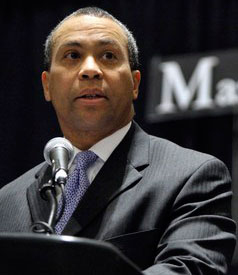
Massachusetts Law Makes Swift Kennedy Succession Unlikely
James Oliphant - The Los Angeles Times
A special election, in no sooner than 145 days, is required under a 2004 law that Kennedy supported then but sought to have reversed in his final days. Obama loses a powerful ally at a critical time.
Washington - Sen. Edward M. Kennedy didn't live to see his last public wish granted.

Massachusetts Gov. Deval Patrick said today that if passed, he would sign legislation giving him the authority to name an interim replacement for Sen. Ted Kennedy. (Photo: Elize Amendola / AP)
Last week, during what turned out to be his final days, Kennedy sent a letter to Massachusetts Gov. Deval Patrick and Democratic leaders of the state Legislature, asking that the state law for choosing a successor be amended.
Kennedy hoped to have Patrick granted the power to choose an interim senator until a special election could be held.
Currently, the only process for replacing a senator in Massachusetts is through a special election, which could take up to five months. Under state law, the governor must set a date for an election between 145 and 160 days from today.
Unless the Legislature moves swiftly to change the law, the state will be represented by just one senator, Democrat John F. Kerry, during that period.
It also means that, with crucial and close votes potentially nearing on healthcare and climate-change legislation, Democrats in the U.S. Senate will be have one less vote.
In a chamber where it takes 40 votes to stall any significant bill - and Republicans hold precisely that number of seats - the new vacancy could be perilous for the White House's agenda. Another Democratic stalwart, Sen. Robert C. Byrd of West Virginia, is seriously ill and frequently misses votes.
In his letter to Patrick, which was written in July but not sent until last week, Kennedy wrote that "it is vital for this commonwealth to have two voices speaking for the needs of its citizens and two votes in the Senate during the approximately five months between a vacancy and an election."
Members of the Massachusetts Legislature were cool to the idea of altering the procedure.
Kennedy's death could change that, however. Republicans in the statehouse accused Kennedy of hypocrisy, noting that he had supported the last change in the law, in 2004, which eliminated the power of the governor to appoint an interim successor.
That was done because of fears that then-Gov. Mitt Romney, a Republican, might appoint a member of his party to replace Kerry if he won the presidency in his race against George W. Bush in 2004.
"This is just a political, partisan consideration," Bradley Jones, the Massachusetts House minority leader, said last week in an interview.
Gov. Patrick is a Democrat. It has been speculated that, if given the power to appoint Kennedy's replacement, he could choose Kennedy's widow, Victoria Reggie Kennedy, or another member of the Kennedy family, such as former Rep. Joseph Kennedy II.
Jones conceded that if Democrats, who hold a commanding grip on the state House, wanted to accede to Kennedy's wishes, they could change the law.
"When the tanks get rolling, they're going to roll over us if they want to do that," Jones said.
Kennedy actually benefited from the previous Massachusetts law. After his brother John won the presidency in 1960, a family friend was appointed to hold the seat until Ted Kennedy was old enough to run in a special election in 1962 - his entry to the Senate.
Kennedy's letter was at times wistful and ruminative, signaling that he believed his days were drawing to a close.
"For almost 47 years, I have had the privilege of representing the people of Massachusetts in the United States Senate," Kennedy wrote, adding that serving in the chamber "has been - and still is - the greatest honor of my public life."
